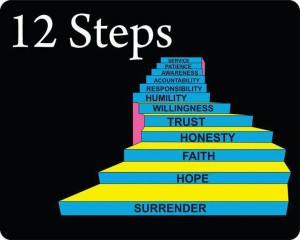Get Help With Alcohol Addiction
- Find meetings near you
- Discover online or in person meetings
- Get 24 hour information on addiction
While the addictions’ field encompasses a wide spectrum of treatment approaches, a good majority of drug treatment programs incorporate the 12 Step support group model within their overall treatment approach. First developed in the 1930s, the 12 Step model originated with and through Alcoholics Anonymous.
Over the course of several decades, this model became a central component within the workings of standardized drug treatment care. The role of 12 Step support groups in the drug treatment process continues to be a vital source of support, direction and community for people recovering from addiction.
The 12 Step Model’s Role within the Drug Treatment Process
According to the U. S. National Library of Medicine, the 12 Step model plays an active role in how 12 Step based treatment facilities design and implement their programs. The 12 Step approach helps in strengthening relationships between local treatment facilities. The principles behind this model also form the basis for many of the treatment interventions used by drug treatment programs.
The 12 Step Support Group Approach within the Drug Treatment Process
The themes that run through the 12 Steps of Alcoholics Anonymous lay out the steps recovering addicts take as they progress towards a drug-free lifestyle. These step-themes include:
- Confronting the addiction problem
- A Change in Attitude
- Changing Belief Systems
- Behavior change
Confronting the Addiction Problem
Confronting the addiction problem becomes the first step in recovery with Step 1 being an admission of powerlessness over addition. This requires a level of honesty that can only come about through heartfelt change. Likewise, Steps 4, 5 and 7, all of which speak to a person’s motivation to get well call for honesty, courage and integrity in the face of addiction.
A Change in Attitude
More often than not, people in recovery have harmed others during the course of using drugs. This type of behavior reflects an attitude towards self and others that can only work to derail a person’s recovery efforts. Step 9 of the 12 Steps deals with asking for forgiveness from those wronged, whereas Step 10 emphasizes making peace with of one’s mistakes which enables a person to move forward in the recovery process. Step 11 encourages those in recovering to embrace a life purpose, which also helps in shaping a healthy attitude towards drug-free living.
Belief Systems
Faulty belief systems act as a driving force behind the addiction mindset. Replacing these lines of thinking with a healthy outlook on life, self and others is an essential part of the recovery process. Steps 2 and 3 in the 12 Step model stress the importance of hope and faith based on the guiding principles of a Higher Power. In effect, these steps promote perseverance and a belief that recovery is possible.
Behavior Change
Ultimately, changes in a person’s daily behaviors and routines become the true signs of growth in recovery. Step 6 stresses the importance of being willing to let go of old behaviors, while Step 8 calls for discipline in following through on making the changes necessary to stay well. Step 12 brings the recovery path full circle calling for actions that demonstrate gratitude by serving and helping others in need.
Considerations
According to the National Institute on Drug Abuse, a good majority of drug treatment programs encourage those in recovery to participate in support group settings as a means for gaining insight, social support and continued guidance throughout the recovery process. While the 12 Step support group approach may not be for everyone, this model continues to prevail as a standard treatment approach.
